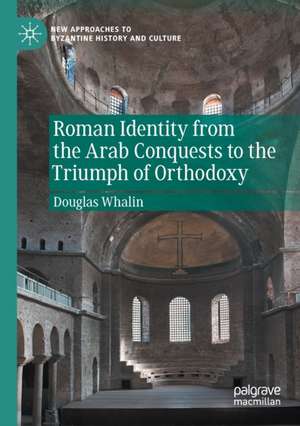Roman Identity from the Arab Conquests to the Triumph of Orthodoxy: New Approaches to Byzantine History and Culture
Autor Douglas Whalinen Limba Engleză Paperback – 23 ian 2022
| Toate formatele și edițiile | Preț | Express |
|---|---|---|
| Paperback (1) | 725.75 lei 6-8 săpt. | |
| Springer International Publishing – 23 ian 2022 | 725.75 lei 6-8 săpt. | |
| Hardback (1) | 730.97 lei 6-8 săpt. | |
| Springer International Publishing – 23 ian 2021 | 730.97 lei 6-8 săpt. |
Din seria New Approaches to Byzantine History and Culture
- 18%
 Preț: 722.43 lei
Preț: 722.43 lei - 15%
 Preț: 693.57 lei
Preț: 693.57 lei - 18%
 Preț: 791.57 lei
Preț: 791.57 lei - 15%
 Preț: 530.42 lei
Preț: 530.42 lei - 15%
 Preț: 705.34 lei
Preț: 705.34 lei - 15%
 Preț: 532.56 lei
Preț: 532.56 lei - 15%
 Preț: 697.82 lei
Preț: 697.82 lei - 18%
 Preț: 891.96 lei
Preț: 891.96 lei - 9%
 Preț: 762.75 lei
Preț: 762.75 lei - 18%
 Preț: 722.89 lei
Preț: 722.89 lei - 18%
 Preț: 721.63 lei
Preț: 721.63 lei - 18%
 Preț: 724.63 lei
Preț: 724.63 lei - 18%
 Preț: 721.01 lei
Preț: 721.01 lei - 18%
 Preț: 781.00 lei
Preț: 781.00 lei - 15%
 Preț: 691.91 lei
Preț: 691.91 lei - 18%
 Preț: 727.48 lei
Preț: 727.48 lei - 18%
 Preț: 732.70 lei
Preț: 732.70 lei - 15%
 Preț: 637.13 lei
Preț: 637.13 lei - 18%
 Preț: 735.84 lei
Preț: 735.84 lei - 18%
 Preț: 738.69 lei
Preț: 738.69 lei - 18%
 Preț: 953.65 lei
Preț: 953.65 lei - 18%
 Preț: 785.55 lei
Preț: 785.55 lei
Preț: 725.75 lei
Preț vechi: 885.06 lei
-18% Nou
Puncte Express: 1089
Preț estimativ în valută:
138.87€ • 145.29$ • 115.36£
138.87€ • 145.29$ • 115.36£
Carte tipărită la comandă
Livrare economică 03-17 aprilie
Preluare comenzi: 021 569.72.76
Specificații
ISBN-13: 9783030609085
ISBN-10: 3030609081
Ilustrații: XII, 315 p. 48 illus.
Dimensiuni: 148 x 210 mm
Greutate: 0.39 kg
Ediția:1st ed. 2020
Editura: Springer International Publishing
Colecția Palgrave Macmillan
Seria New Approaches to Byzantine History and Culture
Locul publicării:Cham, Switzerland
ISBN-10: 3030609081
Ilustrații: XII, 315 p. 48 illus.
Dimensiuni: 148 x 210 mm
Greutate: 0.39 kg
Ediția:1st ed. 2020
Editura: Springer International Publishing
Colecția Palgrave Macmillan
Seria New Approaches to Byzantine History and Culture
Locul publicării:Cham, Switzerland
Cuprins
1 Introduction.- 2 Problems with Early Medieval Romanness.- 3 Formal and Informal Institutions.- 4 Frontier Saints.- 5 Romans, Christians, and Barbarians.- 6 Social Identities.- 7 Epilogue.
Notă biografică
Douglas Whalin is a Research Fellow at the Institute of Christian Oriental Research (ICOR) at the Catholic University of America. He earned his PhD from the University of Cambridge, and was a DFG stipendiary fellow with the Center for Advanced Studies “Migration and Mobility in Late Antiquity and the Early Middle Ages” at the University of Tübingen. He has published works on the social history of the Late Antique and Early Medieval Mediterranean world.
Textul de pe ultima copertă
This book asks how the inhabitants and neighbours of the Eastern Roman Empire understand their identity as Romans in the centuries following the emergence of Islam as a world-religion. Its answers lie in exploring the nature of change and continuity of social structures, self-representation, and boundaries as markers of belonging to the Roman group in the period from circa AD 650 to 850. Early medieval Romanness was integral to the Roman imperial project; its local utility as an identifier was shaped by a given community’s relationship with Constantinople, the capital of the Roman state. This volume argues that there was fundamental continuity of Roman identity from Late Antiquity through these centuries into later periods. Many transformations which are ascribed to the Romans of this era have been subjectively assigned by outsiders, separated by time or space, and are not born out by the sources. This finding dovetails with other recent historical works re-evaluating the early medieval Eastern Roman polity and its ideology.
Douglas Whalin is a Research Fellow at the Institute of Christian Oriental Research (ICOR) at the Catholic University of America. He earned his PhD from the University of Cambridge, and was a DFG stipendiary fellow with the Center for Advanced Studies “Migration and Mobility in Late Antiquity and the Early Middle Ages” at the University of Tübingen. He has published works on the social history of the Late Antique and Early Medieval Mediterranean world.
Caracteristici
Explores how boundaries and other markers of belonging to the Roman group changed in response to the changes created by the emergence of Islam in the early seventh century Engages with a variety of primary sources, including hagiography and historiography in Greek, Syriac and Latin Contextualizes these sources within recent scholarship, for example by Conant, Kaldellis and Stouraitis on similar problems in different places or times
